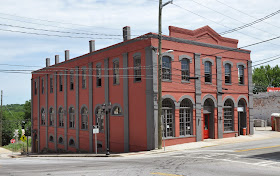Posted by Debby Yoder, ATHENS, GA – The City of Athens
embraced historic preservation in the 1980s when R.E.M., the B-52’s, and the
Indigo Girls where making Athens a music epicenter and much of the country was
tearing down old building. The well-preserved buildings provide a peaceful
balance for the energy and exuberance of college students on their own for the
first time. There is both a sense of history and a look toward the future. Many
of the buildings have signs for more than one business- the original and the
current. Some date from the mid-1800s while others have recently filled what
little space remains.
There is the Morton Building, constructed in 1907 by
Pink Morton, born a slave but rising to prominence. He owned more than 25
buildings in the area, this one in “Hot Corner” the center of black economic
activity during segregated times. Across the street is one of the only downtown
buildings still owned by African-Americans, formerly home to The Athens
Republique, an independent black newspaper but now operating as a soul food
restaurant. Around the corner is the Creature Comforts Brewery that opened this
year in an old tire store. R.E.M. fans will remember Weaver D’s Fine Foods
distinctive square brick building, closed now, but still sporting a bright
green exterior.
Spacious buildings near the railroad tracks are being converted
in lofts as student and local populations continue to grow. Just behind the
iconic UGA arch sits the Holmes-Hamilton Building, named for the students who
integrated the school. It is typically not acknowledged that their bravery
saved all public schools in the state. Governor Vandiver was planning to close
all public schools rather than abide by the landmark Brown v. Board of Education decision when the 1961 federal order to
de-segregate the University of Georgia was handed down. Vandiver knew that it
would be political suicide for him to close the university and deny football
fans their “Dawgs” so he changed course and reluctantly allowed limited
enrollment for blacks.
Most of the downtown area has been converted to
restaurants and bars and on weekends it is packed, especially during football
games. The city hosts a large cycling event, the Athens Twilight Criterion, every April. In June, they offer AthFest, a large music and art festival that takes place over several days on outside
stages and in the clubs in the downtown area. The winter holidays show a
different side with the trees covered in lights illuminating the wide downtown
streets. Things are much quieter during the semester break. Whenever you visit,
it’s a great opportunity to reflect on the lives of the people who have lived
here over the years, they all seem to have been interesting characters.
Debby Yoder is a regular contributor to Social Shutter as well as a Sociology major at Georgia State University. She can be contacted at debby.yoder@gmail.com.



























